- Home
- Kate DiCamillo
The Miraculous Journey of Edward Tulane Page 2
The Miraculous Journey of Edward Tulane Read online
Page 2
“Do you like this shirt with this suit?” she asked him.
Or, “Would you like to wear your black derby? You look very handsome in it. Shall we pack it?”
And then, finally, on a bright Saturday morning in May, Edward and Abilene and Mr. and Mrs. Tulane were all onboard the ship, standing at the railing. Pellegrina was at the dock. On her head, she wore a floppy hat strung around with flowers. She stared straight at Edward. Her dark eyes glowed.
“Goodbye,” Abilene shouted to her grandmother. “I love you.”
The ship pulled away from the dock. Pellegrina waved to Abilene.
“Goodbye, lady,” she called, “goodbye.”
Edward felt something damp in his ears. Abilene’s tears, he supposed. He wished that she would not hold him so tight. To be clutched so fiercely often resulted in wrinkled clothing. Finally, all the people on land, including Pellegrina, disappeared. Edward, for one, was relieved to see the last of her.
As was to be expected, Edward Tulane exacted much attention onboard the ship.
“What a singular rabbit,” said an elderly lady with three strings of pearls wrapped around her neck. She bent down to look more closely at Edward.
“Thank you,” said Abilene.
Several little girls onboard gave Edward deep glances full of longing. They asked Abilene if they might hold him.
“No,” said Abilene, “I’m afraid that he’s not the kind of rabbit who likes to be held by strangers.”
Two young boys, brothers named Martin and Amos, took a particular interest in Edward.
“What does he do?” Martin asked Abilene on their second day at sea. He pointed at Edward who was sitting on a deck chair with his long legs stretched in front of him.
“He doesn’t do anything,” said Abilene.
“Does he wind up somewhere?” asked Amos.
“No,” said Abilene, “he does not wind up.”
“What’s the point of him then?” said Martin.
“The point is that he is Edward,” said Abilene.
“That’s not much of a point,” said Amos.
“It’s not,” agreed Martin. And then, after a long thoughtful pause, he said, “I wouldn’t let anybody dress me like that.”
“Me neither,” said Amos.
“Do his clothes come off?” asked Martin.
“Of course they do,” said Abilene. “He has many different outfits. And he has his own pajamas, too. They are made of silk.”
Edward, as usual, was disregarding the conversation. A breeze was blowing in off the sea, and the silk scarf wrapped around his neck billowed out behind him. On his head, he wore a straw boater. The rabbit was thinking that he must look quite dashing.
It came as a total surprise to him when he was grabbed off the deck chair and first his scarf, and then his jacket and pants, were ripped from his body. He heard his pocket watch hit the deck of the ship; and then, held upside down, he watched the watch roll merrily toward Abilene’s feet.
“Look at him,” said Martin. “He’s even got underwear.” He held Edward aloft so that Amos could see.
“Take it off,” shouted Amos.
“NO!!!!” screamed Abilene.
Martin removed Edward’s underwear.
Edward was paying attention now. He was mortified. He was completely naked except for the hat on his head, and the other passengers onboard the ship were looking at him, directing curious and embarrassed glances his way.
“Give him to me,” screamed Abilene. “He’s mine.”
“No,” said Amos to Martin, “give him to me.” He clapped his hands together and then held them open. “Toss him,” he said.
“Please,” cried Abilene. “Don’t throw him. He’s made of china. He’ll break.”
Martin threw Edward.
And Edward sailed naked through the air. Only a moment ago, the rabbit had thought that being naked in front of a shipload of strangers was the worst thing that could happen to him. But he was wrong. It was much worse being tossed, in the same naked state, from the hands of one grubby, laughing boy to another.
Amos caught Edward and held him up, displaying him triumphantly.
“Throw him back,” called Martin.
Amos raised his arm, but just as he was getting ready to throw Edward, Abilene tackled him, shoving her head into his stomach, and upsetting the boy’s aim.
So it was that Edward did not go flying back into the dirty hands of Martin.
Instead, Edward Tulane went overboard.
HOW DOES A CHINA RABBIT DIE?
Can a china rabbit drown?
Is my hat still on my head?
These were the questions that Edward asked himself as he went sailing out over the blue sea. The sun was high in the sky, and from what seemed to be a very long way away, Edward heard Abilene call his name.
“Edwaaarrd,” she shouted, “come back.”
Come back? Of all the ridiculous things to shout, thought Edward.
As he tumbled, ears over tail through the air, he managed to catch one last glimpse of Abilene. She was standing on the deck of the ship, holding on to the railing with one hand. In her other hand was a lamp — no, it was a ball of fire — no, Edward realized, it was his gold pocket watch that Abilene held in her hand; she was holding it up high, and it was reflecting the light of the sun.
My pocket watch, he thought. I need that.
And then Abilene disappeared from view and the rabbit hit the water with such tremendous force that his hat blew off his head.
That answers that question, thought Edward as he watched the hat dance away on the wind.
And then he began to sink.
He sank and sank and sank. He kept his eyes open the whole time. Not because he was brave, but because he had no choice. His painted-on eyes witnessed the blue water turning to green and then to blue again. They watched as it finally became as black as night.
Edward went down and down. He said to himself, If I am going to drown, certainly I would have done so by now.
Far above him, the ocean liner, with Abilene aboard it, sailed blithely on; and the china rabbit landed, finally, on the ocean floor, face-down; and there, with his head in the muck, he experienced his first genuine and true emotion.
Edward Tulane was afraid.
HE TOLD HIMSELF THAT CERTAINLY Abilene would come and find him. This, Edward thought, is much like waiting for Abilene to come home from school. I will pretend that I am in the dining room of the house on Egypt Street, waiting for the little hand to move to the three and the big hand to land on the twelve. If only I had my watch, then I would know for sure. But it doesn’t matter; she will be here soon, very soon.
Hours passed. And then days. And weeks. And months.
Abilene did not come.
Edward, for lack of anything better to do, began to think. He thought about the stars. He remembered what they looked like from his bedroom window.
What made them shine so brightly, he wondered, and were they still shining somewhere even though he could not see them? Never in my life, he thought, have I been farther away from the stars than I am now.
He considered, too, the fate of the beautiful princess who had become a warthog. Why had she become a warthog? Because the ugly witch turned her into one — that was why.
And then the rabbit thought about Pellegrina. He felt, in some way that he could not explain to himself, that she was responsible for what had happened to him. It was almost as if it was she, and not the boys, who had thrown Edward overboard.
She was like the witch in the story. No, she was the witch in the story. True, she did not turn him into a warthog, but just the same she was punishing him, although for what he could not say.
On the two hundred and ninety-seventh day of Edward’s ordeal, a storm came. The storm was so powerful that it lifted Edward off the ocean floor and led him in a crazy, wild and spinning dance. The water pummeled him and lifted him up and shoved him back down.
Help! thought Edward.
Oh, help me, he thought. I can’t go back there. Help me.
But still, down he went. Down, down, down.
And then, suddenly, the great, wide net of a fisherman reached out and grabbed the rabbit. The net lifted him higher and higher until there was an almost unbearable explosion of light and Edward was back in the world, lying on the deck of a ship, surrounded by fish.
“Eh, what’s this?” said a voice.
“Ain’t no fish,” said another voice. “That’s for sure.”
The light was so brilliant that it was hard for Edward to see. But finally, shapes appeared out of the light, and then faces. And Edward realized that he was looking up at two men, one young and one old.
“Looks like some toy,” said the grizzled old man. He bent and picked Edward up and held him by his front paws, considering him. “A rabbit, I reckon. It’s got whiskers. And rabbit ears, or the shape of rabbit ears at least.”
“Yeah, sure, a rabbit toy,” said the younger man, and he turned away.
“I’ll take it home to Nellie. Let her fix it up and set it to rights. Give it to some child.”
The old man placed Edward carefully on a crate, positioning him so that he was sitting up and could look out at the sea. Edward appreciated the courtesy of this small gesture, but he was heartily sick of the ocean and would have been satisfied never to set eyes on it again.
“There you go,” said the old man.
As they made their way back to shore, Edward felt the sun on his face and the wind blowing through the little bit of fur left on his ears, and something filled his chest, a wonderful feeling.
He was glad to be alive.
“Look at that rabbit,” the old man said. “Looks like it’s enjoying the ride, don’t it?”
“A-yep,” said the young man.
In fact, Edward Tulane was so happy to be back among the living that he did not even take umbrage at being referred to as “it.”
ON LAND, THE OLD FISHERMAN stopped to light a pipe, and then, with the pipe clenched between his teeth, he walked home, carrying Edward atop his left shoulder as if he were a conquering hero. The fisherman balanced him there, placing a callused hand at Edward’s back. He talked to him in a soft, low voice as they walked.
“You’ll like Nellie, you will,” said the old man. “She’s had her sadness, but she’s an all-right girl.”
Edward looked at the small town blanketed in dusk: a jumble of buildings huddled together, the ocean stretching out in front of it all; and he thought that he would like anything and anybody that was not at the bottom of the sea.
“Hello, Lawrence,” called a woman from the front of a shop. “What have you got?”
“Fresh catch,” said the fisherman, “fresh rabbit from the sea.” He lifted his cap to the lady and kept walking.
“There you are, now,” said the fisherman. He took the pipe out of his mouth and pointed with the stem of it at a star in the purpling sky. “There’s your North Star right there. Don’t never have to be lost when you know where that fellow is.”
Edward considered the brightness of the small star.
Do they all have names? he wondered.
“Listen at me,” said the fisherman, “talking to a toy. Oh, well. Here we are, then.” And with Edward still on his shoulder, the fisherman walked up a stone-lined path and into a little green house.
“Look here, Nellie,” he said. “I’ve brought you something from the sea.”
“I don’t want nothing from the sea,” came a voice.
“Aw, now, don’t be like that, Nell. Come and see, then.”
An old woman stepped out of the kitchen, wiping her hands on an apron. When she saw Edward, she dropped the apron and clapped her hands together and said, “Oh, Lawrence, you brung me a rabbit.”
“Direct from the sea,” said Lawrence. He took Edward off his shoulder and stood him up on the floor and held on to his hands and made him take a deep bow in the direction of Nellie.
“Oh,” said Nellie, “here.” She clapped her hands together again and Lawrence passed Edward to her.
Nellie held the rabbit out in front of her and looked him over from tip to toe. She smiled. “Have you ever in your life seen anything so fine?” she said.
Edward felt immediately that Nellie was a very discerning woman.
“She’s beautiful,” breathed Nellie.
For a moment, Edward was confused. Was there some other object of beauty in the room?
“What will I call her?”
“Susanna?” said Lawrence.
“Just right,” said Nellie. “Susanna.” She looked deep into Edward’s eyes. “First off, Susanna will need some clothes, won’t she?”
AND SO EDWARD TULANE BECAME Susanna. Nellie sewed several outfits for him: a pink dress with ruffles for special occasions, a simple shift fashioned out of a flower-covered cloth for everyday use, and a long white gown made of cotton for Edward to sleep in. In addition, she remade his ears, stripping them of the few pieces of fur that remained and designing him a new pair.
“Oh,” she told him when she was done, “you look lovely.”
He was horrified at first. He was, after all, a boy rabbit. He did not want to be dressed as a girl. And the outfits, even the special-occasion dress, were so simple, so plain. They lacked the elegance and artistry of his real clothes. But then Edward remembered lying on the ocean floor, the muck in his face, the stars so far away, and he said to himself, What difference does it make really? Wearing a dress won’t hurt me.
Besides, life in the little green house with the fisherman and his wife was sweet. Nellie loved to bake, and so she spent her day in the kitchen. She put Edward on the counter and leaned him up against the flour canister and arranged his dress around his knees. She bent his ears so that he could hear well.
And then she set to work, kneading dough for bread and rolling out dough for cookies and pies. The kitchen soon filled with the smell of baking bread and with the sweet smells of cinnamon and sugar and cloves. The windows steamed up. And while Nellie worked, she talked.
She told Edward about her children, her daughter, Lolly, who was a secretary, and her boys: Ralph, who was in the army, and Raymond, who had died of pneumonia when he was only five years old.
“He drowned inside of himself,” said Nellie. “It is a horrible, terrible thing, the worst thing, to watch somebody you love die right in front of you and not be able to do nothing about it. I dream about him most nights.”
Nellie wiped at her tears with the back of her hands. She smiled at Edward.
“I suppose you think I’m daft, talking to a toy. But it seems to me that you are listening, Susanna.”
And Edward was surprised to discover that he was listening. Before, when Abilene talked to him, everything had seemed so boring, so pointless. But now, the stories Nellie told struck him as the most important thing in the world and he listened as if his life depended on what she said. It made him wonder if some of the muck from the ocean floor had gotten inside his china head and damaged him somehow.
In the evening, Lawrence came home from the sea and there was dinner and Edward sat at the table with the fisherman and his wife. He sat in an old wooden highchair; and while at first he was mortified (a highchair, after all, was a chair designed for babies, not for elegant rabbits), he soon became used to it. He liked being up high, looking out over the table instead of staring at the tablecloth as he had at the Tulane household. He liked feeling like a part of things.
Every night after dinner, Lawrence said that he thought he would
go out and get some fresh air and that maybe Susanna would like to come with him. He placed Edward on his shoulder as he had that first night when he walked him through town, bringing him home to Nellie.
They went outside and Lawrence lit his pipe and held Edward there on his shoulder; and if the night was clear, Lawrence said the names of the constellations one at a time, Andromeda, Pegasus, pointing at them with the stem of his pipe. Edward loved looking up at the stars, and he loved the sounds of the constellation names. They were sweet in his ears.
Sometimes, though, staring up at the night sky, Edward remembered Pellegrina, saw again her dark and glowing eyes, and a chill would go through him.
Warthogs, he would think. Witches.
But Nellie, before she put him to bed each night, sang Edward a lullaby, a song about a mockingbird that did not sing and a diamond ring that would not shine, and the sound of Nellie’s voice soothed the rabbit and he forgot about Pellegrina.
Life, for a very long time, was sweet.
And then Lawrence and Nellie’s daughter came for a visit.
LOLLY WAS A LUMPY WOMAN WHO spoke too loudly and who wore too much lipstick. She entered the house and immediately spotted Edward sitting on the living-room couch.
“What’s this?” she said. She put down her suitcase and picked Edward up by one foot. She held him upside down.
“That’s Susanna,” said Nellie.
“Susanna!” shouted Lolly. She gave Edward a shake.
His dress was up over his head and he could see nothing. Already, he had formed a deep and abiding hatred for Lolly.
“Your father found her,” said Nellie. “She came up in a net and she didn’t have no clothes on her, so I made her some dresses.”
“Have you gone skivvy?” shouted Lolly. “Rabbits don’t need clothes.”

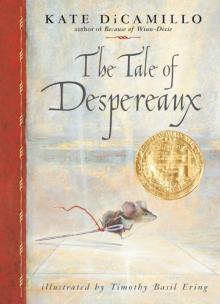 The Tale of Despereaux
The Tale of Despereaux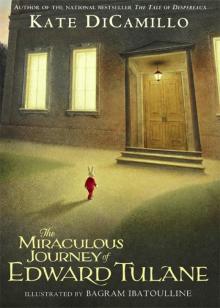 The Miraculous Journey of Edward Tulane
The Miraculous Journey of Edward Tulane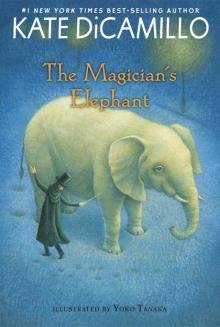 The Magician's Elephant
The Magician's Elephant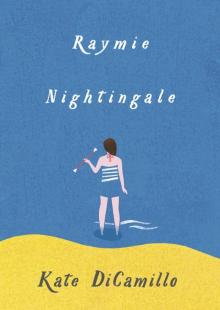 Raymie Nightingale
Raymie Nightingale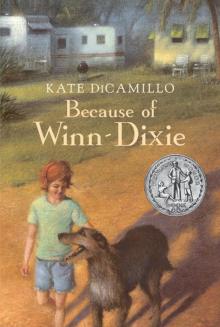 Because of Winn-Dixie
Because of Winn-Dixie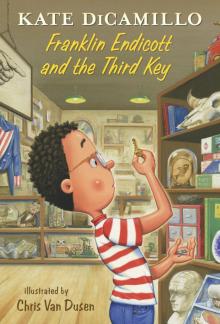 Franklin Endicott and the Third Key
Franklin Endicott and the Third Key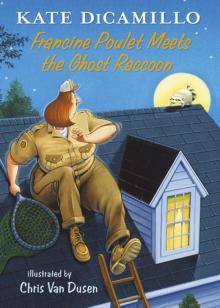 Francine Poulet Meets the Ghost Raccoon
Francine Poulet Meets the Ghost Raccoon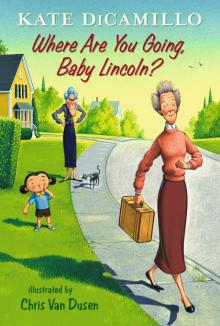 Where Are You Going, Baby Lincoln?
Where Are You Going, Baby Lincoln?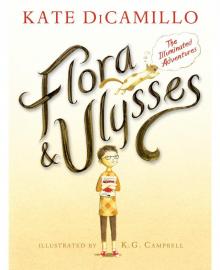 Flora & Ulysses: The Illuminated Adventures
Flora & Ulysses: The Illuminated Adventures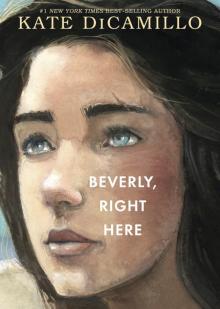 Beverly, Right Here
Beverly, Right Here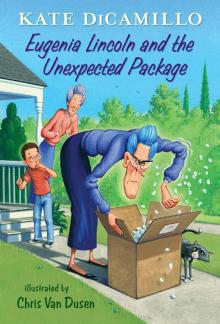 Eugenia Lincoln and the Unexpected Package
Eugenia Lincoln and the Unexpected Package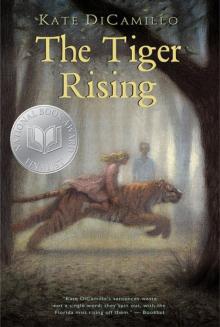 The Tiger Rising
The Tiger Rising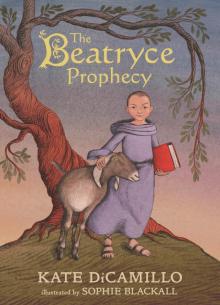 The Beatryce Prophecy
The Beatryce Prophecy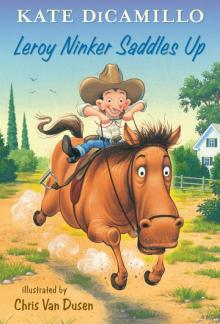 Leroy Ninker Saddles Up
Leroy Ninker Saddles Up